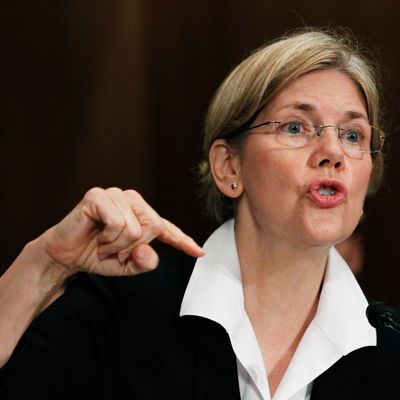
Elizabeth Warren may or may not be running for president, and if she does, she probably won’t win. But the importance of a Warren candidacy (or, quite possibly, the mere threat of one) is not her prospects for wresting the nomination from Hillary Clinton. It’s that she can unlock the most potent, untapped issue in American politics: financial reform.
Noam Scheiber’s must-read cover story in The New Republic lays out the emerging Warren phenomenon, explaining, among other things, why the likelihood of defeat by Clinton would not deter her. Ben White and Maggie Haberman have zeroed in on the most important ramification of her candidacy, which is the impact she would bring to bear on other candidates:
“The nightmare scenario for banks is to hear these arguments from a candidate on the far left and on the far right,” said Jaret Seiberg, a financial services industry analyst at Guggenheim Partners. “Suddenly, you have Elizabeth Warren screaming about ‘too big to fail’ on one side and Rand Paul screaming about it on the other side, and then candidates in the middle are forced to weigh in.”
“Far left” and “far right” are odd terms to describe this dynamic. If Warren’s candidacy is so ideologically marginal, why would it force a juggernaut like Clinton to co-opt her ideas? And why would the “far right” follow suit? The answer is that her main policy idea, more stringent financial regulation, is not ideologically marginal. It’s a popular, centrist, and even bipartisan notion that has been politically marginalized for temporary, idiosyncratic reasons.
Polling firms don’t spend tons of time asking people about financial regulation, but the available data all point in the same rough direction. A September New York Times poll finds that Americans disapprove of the 2008 financial bailout by a 24-point margin, and believe that not enough “bankers and employees of financial institutions” were prosecuted by a staggering 70-point margin. Another poll (by a liberal advocacy group) from around the same time asked more directly about financial regulation, and found a 50-point advantage favoring tougher regulation of financial institutions.
It’s odd that a staggeringly lopsided issue has played so little a role in national politics the last five years. The initial 2008 bailout vote took place in emergency conditions, with the cooperation of a Democratic House and a Republican president, and so close to the election that neither party had the chance to tailor its campaign message to take advantage of the public backlash. Republicans subsequently benefited from the backlash against the financial bailout merely by being the opposition party, but they never crafted a serious agenda against Wall Street. President Obama fought for and passed a legislative response, the Dodd-Frank regulations, which placed him in the position of defending the status quo. That, in turn, helped provoke a wild, paranoid backlash on Wall Street, memorably chronicled by Gabriel Sherman, that drove the industry into a full alliance with the GOP. By the 2012 cycle, Wall Street had titled its donations heavily to Republicans, who were pledging to repeal Dodd-Frank while nominating a financier at the top of the ticket.
So what may be the most powerful issue in American politics has lay unused by either party since the crisis. Either party could pick it up. A bill to break up the big banks has the sponsorship of liberal Democrat Sherrod Brown and conservative Republican David Vitter. Warren has a tough regulatory proposal of her own, which has the support of John McCain. A Warren campaign could force Clinton to follow suit, and possibly even pressure the Republican nominee.
Clinton’s own calculation on financial reform could be the most unpredictable and fascinating policy dynamic of the campaign. She has generally been associated with the policy consensus of her husband’s presidency. But Clinton’s endorsement of loose financial regulation might as well have happened a lifetime ago. The Democratic-leaning financiers who turned bitterly against Obama are placing all their hope in Hillary Clinton as the vehicle of their deliverance from the populist hordes; Lloyd Blankfein, who joined many Wall Street titans in tilting heavily from Obama to the Republicans, rapturously praises Clinton now. (Naturally, he fancies Chris Christie, too.)
Clinton may fulfill the hopes of her Wall Street devotees. On the other hand, she may decide she needs their money less than she needs populist credibility. Wall Street has grown accustomed to defending itself in comfortable anonymity, safely tucked outside the public spotlight. Those cozy days may come to an end, and Warren is the most likely candidate to end them.






























